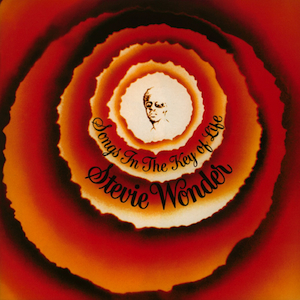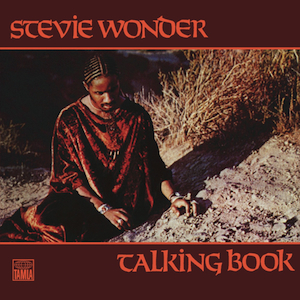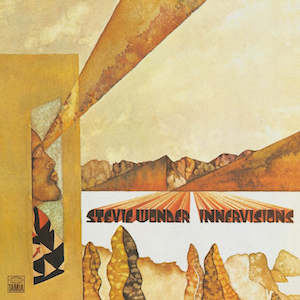
Stevland Hardaway Morris, known professionally as Stevie Wonder, is an American singer-songwriter, musician, and record producer. He is credited as a pioneer and influence by musicians across a range of genres that include R&B, pop, soul, gospel, funk, and jazz. A virtual one-man band, Wonder's use of synthesizers and other electronic musical instruments during the 1970s reshaped the conventions of contemporary R&B. He also helped drive such genres into the album era, crafting his LPs as cohesive and consistent, in addition to socially conscious statements with complex compositions. Blind since shortly after his birth, Wonder was a child prodigy who signed with Motown's Tamla label at the age of 11, where he was given the professional name Little Stevie Wonder.

Songs in the Key of Life is the eighteenth studio album by American singer, songwriter and musician Stevie Wonder. A double album, it was released on September 28, 1976, by Tamla Records, a division of Motown. It was recorded primarily at Crystal Sound studio in Hollywood, with some sessions recorded at the Record Plant in Hollywood, the Record Plant in Sausalito, and The Hit Factory in New York City; final mixing was conducted at Crystal Sound. The album has been regarded by music journalists as the culmination of Wonder's "classic period" of recording.

Talking Book is the fifteenth studio album by American singer, songwriter, and musician Stevie Wonder, released on October 27, 1972, by Tamla, a subsidiary of Motown Records. This album and Music of My Mind, released earlier the same year, are generally considered to mark the start of Wonder's "classic period". The sound of the album is sharply defined by Wonder's use of keyboards and synthesizers.

Innervisions is the sixteenth studio album by American singer, songwriter, and musician Stevie Wonder, released on August 3, 1973, by Tamla, a subsidiary of Motown Records. A landmark recording of Wonder's "classic period", the album has been regarded as completing his transition from the "Little Stevie Wonder" known for romantic ballads into a more musically mature, conscious, and grown-up artist. On the album, Wonder continued to experiment with the revolutionary T.O.N.T.O. synthesizer system developed by Malcolm Cecil and Robert Margouleff, and Innervisions became hugely influential on the future sound of commercial soul and black music.

"Sir Duke" is a song composed and performed by Stevie Wonder from his 1976 album Songs in the Key of Life. Released as a single in 1977, the track topped the U.S. Billboard Hot 100 and Black Singles charts, and reached number two in the UK Singles Chart, his joint biggest hit there at the time. Billboard ranked it as the No. 18 song of 1977.

Hotter than July is the nineteenth studio album by American singer, songwriter, and musician Stevie Wonder, released on September 29, 1980, by Tamla, a subsidiary of Motown Records. Wonder primarily recorded the album in Los Angeles at Wonderland Studios, which he had recently acquired. The album peaked at number three on the Billboard Top LPs & Tapes chart and was certified Platinum by the Recording Industry Association of America (RIAA) on February 3, 1981. It was Wonder's most successful album in the UK, where it peaked at number two on the UK Albums Chart and produced four top ten singles. Music videos were produced for the album's first, third, and fourth singles.

"Superstition" is a song by American singer-songwriter Stevie Wonder. It was released on October 24, 1972, as the lead single from his fifteenth studio album, Talking Book (1972), by Tamla. The lyrics describe popular superstitions and their negative effects.

"I Wish" is a song by American singer Stevie Wonder. It was released in late 1976 as the lead single from his eighteenth album, Songs in the Key of Life (1976). Written and produced by Wonder, the song focuses on his childhood from the 1950s into the early 1960s about how he wished he could go back and relive it. The single hit number one on the Billboard Hot 100 and soul singles chart. At the 19th Grammy Awards, Stevie Wonder won the Best R&B Vocal Performance, Male for this song.

Nathan Lamar Watts is an American session bassist, best known for his work with Stevie Wonder from the 1970s to the present. He has served as Stevie Wonder's musical director since 1994.

"I Just Called to Say I Love You" is a ballad written, produced, and performed by American R&B singer and songwriter Stevie Wonder. It was a major international hit, and remains Wonder's best-selling single to date, having topped a record 19 charts.

American musician Stevie Wonder has released 23 studio albums, three soundtrack albums, four live albums, 11 compilations, one box set, and 91 singles. His first album, The Jazz Soul of Little Stevie, was released in 1962 when he was 12 years old, and his most recent, A Time to Love, was released in 2005.

Where I'm Coming From is the 13th studio album by Stevie Wonder. The album was released by Motown Records on April 9, 1971 and peaked on the Billboard Pop Albums at #62, and on the Billboard R&B Albums Chart at #7. All nine songs were written by Wonder and Motown singer-songwriter Syreeta Wright, his first wife. It was the last album produced under his first contract with Motown Records. Including live albums, this is Stevie Wonder's fifteenth album overall, and thirteenth studio album.
Ronald Norman Miller was an American popular songwriter and record producer who wrote for Motown artists in the 1960s and 1970s and attained many Top 10 hits. Some of his songs, such as "For Once in My Life", have become pop standards.
"For Once in My Life" is a song written by Ron Miller and Orlando Murden for Motown Records' Stein & Van Stock publishing company, and first recorded in 1965.

"Superwoman " is a 1972 soul track by Stevie Wonder. It was the second track on Wonder's Music of My Mind album, and was also released as the first single. The song reached a peak of number 33 on the Billboard Hot 100 chart.

"I Ain't Gonna Stand for It" is the second single from Stevie Wonder's 1980 album, Hotter Than July. It reached number four on the Billboard R&B singles chart and number 11 on the Hot 100. It also hit number 10 on the UK Singles Chart. The song is famous for Wonder's imitation of a seasoned country-and-western crooner and his inspiring drumming. Charlie and Ronnie Wilson of The Gap Band provide backing vocals on the song. It was covered by Eric Clapton in 2001.

Song Review: A Greatest Hits Collection is a double-disc compilation album by Stevie Wonder. It was also released as a single disc edition which contained 6 tracks not featured on the 2CD release. The Australian edition has a slightly different track listing.
"They Won't Go When I Go" is a song co-written and performed by Stevie Wonder from his 1974 album Fulfillingness' First Finale.
"Wonder-ful" is the twenty-first episode of the fourth season of the American musical television series Glee, and the eighty-seventh episode overall. It aired on Fox in the United States on May 2, 2013, and features the introduction of special guest star Katey Sagal as Nancy Abrams and the return of special guest star Kate Hudson as Cassandra July. The episode is a tribute to the music of Stevie Wonder.

I Am Ali is a 2014 documentary directed by Clare Lewins. It covers the life of professional boxer Muhammad Ali. The film tells his story using personal audio recordings Ali made himself during the 1970s. Additionally, interviews of friends, family members, and people associated with professional boxing, combined with archival footage of Ali, are used throughout the movie. Notable appearances in the film include George Foreman, Jim Brown, and Mike Tyson.















